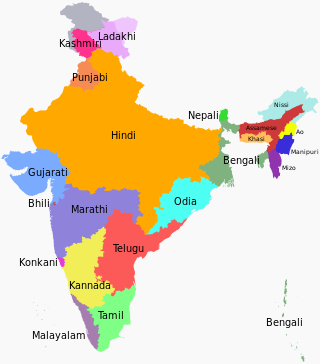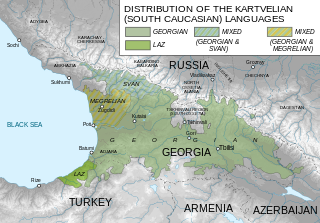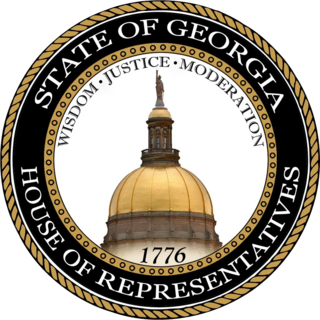
The Thirteenth Amendment to the United States Constitution abolished slavery and involuntary servitude, except as punishment for a crime. The amendment was passed by the Senate on April 8, 1864, by the House of Representatives on January 31, 1865, and ratified by the required 27 of the then 36 states on December 6, 1865, and proclaimed on December 18. It was the first of the three Reconstruction Amendments adopted following the American Civil War.

Georgia is a transcontinental country at the intersection of Eastern Europe and Western Asia. It is part of the Caucasus region, bounded by the Black Sea to the west, Russia to the north and northeast, Turkey to the southwest, Armenia to the south, and by Azerbaijan to the southeast. The country covers an area of 69,700 square kilometres (26,900 sq mi), and has a population of 3.7 million people. Tbilisi is its capital and largest city, home to roughly a third of the Georgian population.

Georgia is a state in the Southeastern region of the United States, bordered to the north by Tennessee and North Carolina; to the northeast by South Carolina; to the southeast by the Atlantic Ocean; to the south by Florida; and to the west by Alabama. Georgia is the 24th-largest state in area and 8th most populous of the 50 United States. Its 2020 population was 10,711,908, according to the U.S. Census Bureau. Atlanta, a "beta(+)" global city, is both the state's capital and its largest city. The Atlanta metropolitan area, with a population of more than 6 million people in 2021, is the 8th most populous metropolitan area in the United States and contains about 57% of Georgia's entire population.

Languages spoken in the Republic of India belong to several language families, the major ones being the Indo-Aryan languages spoken by 78.05% of Indians and the Dravidian languages spoken by 19.64% of Indians, both families together are sometimes known as Indic languages. Languages spoken by the remaining 2.31% of the population belong to the Austroasiatic, Sino–Tibetan, Tai–Kadai, and a few other minor language families and isolates. As per the People's Linguistic Survey of India, India has the second highest number of languages (780), after Papua New Guinea (840). Ethnologue lists a lower number of 456.

Eduard Ambrosis dze Shevardnadze was a Soviet and Georgian politician and diplomat who governed Georgia for several non-consecutive periods from 1972 until his resignation in 2003 and also served as the final Soviet Minister of Foreign Affairs from 1985 to 1990.
Bihari is a group of the Indo-Aryan languages. The Bihari languages are mainly spoken in the Indian states of Bihar, Jharkhand, West Bengal and Uttar Pradesh and also in Nepal. The most widely spoken languages of the Bihari group are Bhojpuri, Magahi and Maithili.

The Georgian Soviet Socialist Republic, also known as Soviet Georgia, the Georgian SSR, or simply Georgia, was one of the republics of the Soviet Union from its second occupation in 1921 to its independence in 1991. Coterminous with the present-day republic of Georgia, it was based on the traditional territory of Georgia, which had existed as a series of independent states in the Caucasus prior to the first occupation of annexation in the course of the 19th century. The Georgian SSR was formed in 1921 and subsequently incorporated in the Soviet Union in 1922. Until 1936 it was a part of the Transcaucasian Socialist Federative Soviet Republic, which existed as a union republic within the USSR. From November 18, 1989, the Georgian SSR declared its sovereignty over Soviet laws. The republic was renamed the Republic of Georgia on November 14, 1990, and subsequently became independent before the dissolution of the Soviet Union on April 9, 1991, whereupon each former SSR became a sovereign state.

There is no national language in the Republic of India. However, article 343(1) of the Indian constitution specifically mentions that "The official language of the Union shall be Hindi in Devanagari script. The form of numerals to be used for the official purposes of the Union shall be the international form of Indian numerals," while clause 3 of the Official Languages Act, 1963 mentions the "Continuation of English Language for official purposes of the Union and for use in Parliament", thus denoting Hindi and English as the official languages of the Union. Business in the Indian parliament may only be conducted in Hindi or in English. However, according to Article 120, members of parliament are allowed to speak and present their views in any of the 22 scheduled languages recognized by the Constitution of India. English is allowed to be used in official purposes such as parliamentary proceedings, judiciary, communications between the Central Government and a State Government. There are various official languages in India at the state/territory level. States within India have the liberty and powers to specify their own official language(s) through legislation. In addition to the official languages, the constitution recognizes 22 regional languages, which include Hindi but not English, as scheduled languages.

Mingrelian or Megrelian is a Kartvelian language spoken in Western Georgia, primarily by the Mingrelians. The language was also called kolkhuri in the early 20th century. Mingrelian has historically been only a regional language within the boundaries of historical Georgian states and then modern Georgia, and the number of younger people speaking it has decreased substantially, with UNESCO designating it as a "definitely endangered language".

The republics of Russia are 21 territories in the Russian Federation that each constitute a federal subject, the highest-level administrative division of Russian territory. They are one of several types of federal subject in Russia. The republics were originally created as nation states for ethnic minorities. The indigenous ethnic group that gives its name to the republic is referred to as the titular nationality. However, due to centuries of Russian migration, each nationality is not necessarily a majority of a republic's population.

"Tavisupleba" is the national anthem of Georgia. It was adopted as the Georgian national anthem in May 2004, along with a new national flag and coat of arms. The symbols' change was brought about upon the successful overthrow of the previous government in the bloodless Rose Revolution. The music, taken from the Georgian operas Abesalom da Eteri and Daisi, by the Georgian composer Zacharia Paliashvili, was adapted to form it by Ioseb Kechakmadze. The lyrics were composed by David Magradze.

The Georgia House of Representatives is the lower house of the Georgia General Assembly of the U.S. state of Georgia. There are currently 180 elected members. Republicans have had a majority in the chamber since 2005. The current House Speaker is Jon G. Burns.

Prior to the Supreme Court's decision in Obergefell v. Hodges (2015), U.S. state constitutional amendments banning same-sex unions of several different types passed, banning legal recognition of same-sex unions in U.S. state constitutions, referred to by proponents as "defense of marriage amendments" or "marriage protection amendments." These state amendments are different from the proposed Federal Marriage Amendment, which would ban same-sex marriage in every U.S. state, and Section 2 of the Defense of Marriage Act, more commonly known as DOMA, which allowed the states not to recognize same-sex marriages from other states. The amendments define marriage as a union between one man and one woman and prevent civil unions or same-sex marriages from being legalized, though some of the amendments bar only the latter. The Obergefell decision in June 2015 invalidated these state constitutional amendments insofar as they prevented same-sex couples from marrying, even though the actual text of these amendments remain written into the state constitutions.

The Georgian–Ossetian conflict is an ethno-political conflict over Georgia's former autonomous region of South Ossetia, which evolved in 1989 and developed into a war. Despite a declared ceasefire and numerous peace efforts, the conflict remained unresolved. In August 2008, military tensions and clashes between Georgia and South Ossetian separatists erupted into the Russo-Georgian War. Since then, South Ossetia has been under Russian occupation.

The South Ossetian Autonomous Oblast was an autonomous oblast of the Soviet Union created within the Georgian SSR on April 20, 1922. Its autonomy was revoked on December 11, 1990 by the Supreme Soviet of the Georgian SSR, leading to the First South Ossetian War. Currently, its territory is controlled by the breakaway Republic of South Ossetia.

While rights have advanced significantly since the start of the 21st century, lesbian, gay, bisexual and transgender (LGBT) people in Georgia still face some legal challenges that non-LGBT people do not experience. Georgia is one of only a few countries in the former Soviet space that directly prohibits discrimination against all LGBT people in legislation, labor-related or otherwise. Since 2012, Georgian law has considered crimes committed on the grounds of one's sexual orientation or gender identity an aggravating factor in prosecution. Despite this, homosexuality is still considered a major deviation from the highly traditional Orthodox Christian values prevalent in the country, where public discussions of sexuality in general tend to be viewed in a highly negative light. Consequently, homosexuals are often targets of abuse and physical violence, often actively encouraged by religious leaders. According to the 2021 International Social Survey Programme (ISSIP) study, 84% of the Georgian public thinks that sexual relations between two adults of the same sex are always wrong, which is the highest score in Europe.
On 14 April 1978, demonstrations in Tbilisi, capital of the Georgian SSR, took place in response to an attempt by the Soviet government to change the constitutional status of languages in Georgia. After a new Soviet Constitution was adopted in October 1977, the Supreme Soviet of the Georgian SSR considered a draft constitution in which, in contrast to the Constitution of 1936, Georgian was no longer declared to be the sole State language. A series of indoor and outdoor actions of protest ensued and implied with near-certainty there would be a clash between several thousands of demonstrators and the Soviet government, but Georgian Communist Party chief Eduard Shevardnadze negotiated with the central authorities in Moscow and managed to obtain permission to retain the previous status of the Georgian language.

The official language of Ukraine is Ukrainian, an East Slavic language, which is the native language of 67.5% of Ukraine's population. Ethnologue lists 40 minority languages and dialects; nearly all are native to the former Soviet Union. As a result of legislation entitled the 'Bill on the principles of the state language policy" from 2012, languages spoken by at least 10% of an oblast's population were made possible to be elevated to the status of 'regional language'. However, in 2014 the Constitutional Court of Ukraine started reviewing the constitutionality of the law, and on 28 February 2018 it ruled the law unconstitutional and the law was abolished.
The Department Official Language is the Government of India's department responsible for the implementation of the provisions of the Constitution relating to official languages and the provisions of the Official Languages Act, 1963. Department of Official Language was set up in June 1975 as an independent Department of the Ministry of Home Affairs.















